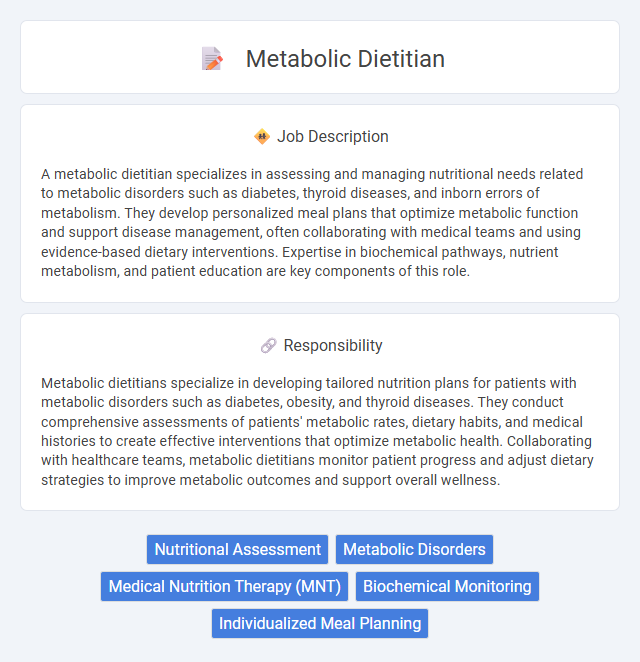
A metabolic dietitian specializes in assessing and managing nutritional needs related to metabolic disorders such as diabetes, thyroid diseases, and inborn errors of metabolism. They develop personalized meal plans that optimize metabolic function and support disease management, often collaborating with medical teams and using evidence-based dietary interventions. Expertise in biochemical pathways, nutrient metabolism, and patient education are key components of this role.
Individuals with strong analytical skills and a passion for nutrition are likely suitable for a career as a metabolic dietitian. Those who enjoy working with patients managing chronic conditions like diabetes, obesity, or metabolic disorders may find this role particularly fitting. People who prefer hands-on, patient-centered care combined with research aspects probably have a higher chance of thriving in this job.
Qualification
A metabolic dietitian must hold a registered dietitian nutritionist (RDN) credential, typically requiring a bachelor's degree in dietetics, nutrition, or a related field, alongside supervised clinical experience. Advanced certifications such as Certified Specialist in Obesity and Weight Management (CSOWM) or additional training in metabolic disorders enhance expertise. Strong knowledge of metabolism, biochemical processes, and personalized nutrition plans is essential for effective patient care.
Responsibility
Metabolic dietitians specialize in developing tailored nutrition plans for patients with metabolic disorders such as diabetes, obesity, and thyroid diseases. They conduct comprehensive assessments of patients' metabolic rates, dietary habits, and medical histories to create effective interventions that optimize metabolic health. Collaborating with healthcare teams, metabolic dietitians monitor patient progress and adjust dietary strategies to improve metabolic outcomes and support overall wellness.
Benefit
Working as a metabolic dietitian likely offers substantial benefits, including the opportunity to tailor nutrition plans that improve patients' metabolic health and prevent chronic diseases. There is a high probability of job satisfaction due to directly impacting individuals' well-being and facilitating sustainable lifestyle changes. This career path may also provide stable employment prospects given the increasing demand for specialized dietary guidance in healthcare.
Challenge
Metabolic dietitians likely encounter challenging cases that require precise nutritional strategies tailored to individuals with complex metabolic disorders. The role probably demands staying updated with cutting-edge research to effectively manage diseases such as diabetes, obesity, and metabolic syndrome. Problem-solving skills and adaptability are likely essential to overcome the unpredictable nature of patient responses and evolving treatment protocols.
Career Advancement
Metabolic dietitians specializing in managing metabolic disorders such as diabetes and obesity can advance their careers by obtaining certifications like the Certified Diabetes Educator (CDE) or Board Certified Specialist in Obesity and Weight Management (CSOWM). Gaining experience in clinical settings and participating in research on metabolic health enhances opportunities for leadership roles, academic positions, or consultancy in healthcare organizations. Pursuing advanced degrees, such as a Master's or Doctorate in Nutrition or Public Health, further supports career growth and specialization in metabolic dietetics.
Key Terms
Nutritional Assessment
Metabolic dietitians specialize in conducting comprehensive nutritional assessments to evaluate patients' metabolic health, biochemical data, and dietary intake. They utilize advanced tools such as indirect calorimetry, body composition analysis, and lab results to tailor individualized nutrition plans. Accurate nutritional assessment is essential for managing metabolic disorders, optimizing energy balance, and improving patient outcomes.
Metabolic Disorders
Metabolic dietitians specialize in managing metabolic disorders such as diabetes, metabolic syndrome, and inherited metabolic diseases by creating tailored nutrition plans that optimize metabolic function. They utilize biochemical and clinical data to develop interventions that regulate blood sugar levels, improve lipid profiles, and support enzyme deficiencies. Expertise in nutrient metabolism and metabolic pathways enables these professionals to enhance patient outcomes through personalized dietary strategies.
Medical Nutrition Therapy (MNT)
Metabolic dietitians specialize in Medical Nutrition Therapy (MNT) to manage chronic metabolic disorders such as diabetes, obesity, and lipid abnormalities. They develop personalized nutrition plans based on biochemical data, metabolic conditions, and patient-specific goals to optimize metabolic function and disease outcomes. Expertise in MNT enables these professionals to effectively reduce complications and improve quality of life through targeted dietary interventions.
Biochemical Monitoring
Metabolic dietitians specialize in biochemical monitoring to assess nutrient metabolism and manage metabolic disorders effectively. They analyze blood, urine, and other biochemical markers to tailor dietary interventions that optimize metabolic function and prevent complications. Expertise in metabolic pathways and laboratory data interpretation is essential for accurate diagnosis and personalized nutrition therapy.
Individualized Meal Planning
Metabolic dietitians specialize in creating individualized meal plans tailored to each patient's metabolic needs, health conditions, and lifestyle factors. They assess metabolic rates, nutrient deficiencies, and biochemical markers to optimize dietary interventions for conditions such as diabetes, obesity, and metabolic syndrome. Their expertise ensures personalized nutrition strategies that enhance metabolic efficiency and support long-term health outcomes.
 kuljobs.com
kuljobs.com